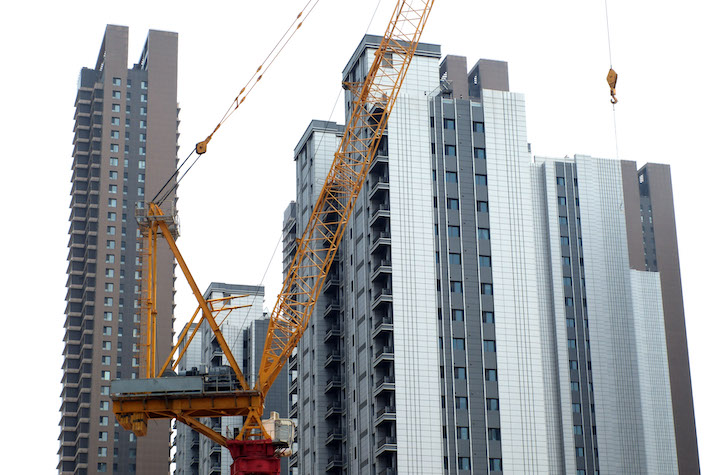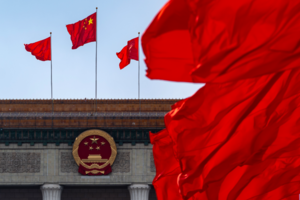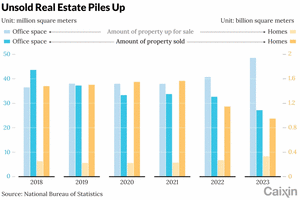China’s Fiscal Revenue and Land Sales Continue to Fall as Property Slump Grinds On
Listen to the full version

Both China’s national fiscal revenue and its land sale revenue continued to decline in April as the real estate downturn showed no sign of recovery.
The national fiscal revenue fell by 3.7% year-on-year in April, 1.3 percentage points larger than the fall in March, according to data released by the Ministry of Finance Monday.
Non-tax revenue was the main drag, with a growth of 5.8%, down 6.4 percentage points from March. Tax revenue fell 4.9% year-on-year, narrowing by 2.8 percentage points.

Download our app to receive breaking news alerts and read the news on the go.
Get our weekly free Must-Read newsletter.
- DIGEST HUB
- China's national fiscal revenue fell by 3.7% year-on-year in April 2024, with a notable decline in land sale revenue as the real estate market struggles.
- Main tax categories such as domestic value-added tax and individual income tax saw significant declines of 9.6% and 18.8%, respectively.
- Government expenditure increased by 6.1% in April, reversing a 2.9% decline in March, possibly due to the acceleration of national debt projects.
Both China’s national fiscal revenue and revenue from land sales declined in April due to an ongoing slump in the real estate sector [para. 1]. National fiscal revenue fell by 3.7% year-on-year in April, a larger decline compared to the 2.4% drop observed in March, according to data from the Ministry of Finance [para. 2]. Non-tax revenue experienced a growth of 5.8%, which was a reduction from March’s 12.2% growth [para. 3]. Tax revenue dropped by 4.9% year-on-year but improved from March’s 7.7% decline [para. 3].
From January to April 2024, national fiscal revenue rose by 2% to 8.09 trillion yuan ($1.12 trillion), despite the monthly declines [para. 4]. The major tax sections saw significant reductions; domestic value-added tax and individual income tax revenue decreased by 9.6% and 18.8% year-on-year respectively [para. 5]. The fall in personal income tax revenue could be attributed to the carryover effect of the increased personal tax special additional deductions implemented last year [para. 5].
In August 2023, the State Council doubled the monthly deduction for personal income tax for childcare from 1,000 yuan to 2,000 yuan and implemented other changes that increased deductions for children’s education and elderly support starting January 1, 2023 [para. 6][para. 7]. Despite the general decline, domestic consumption tax and corporate income tax posted modest gains in April, growing year-on-year by 2.1% and 0.7%, respectively [para. 8].
Yet, deed tax on property transactions dropped for the second month in a row, down 9.6% in April, although the rate of decline showed some improvement compared to March’s figures [para. 9]. Revenue from land use rights sales, contributing almost 80% to government-managed funds, plunged by 10.4% in April. This downturn was sharper compared to the first quarter, indicating persistently weak land sales [para. 10]. Specifically, monthly land sale revenue plummeted 21.2% year-on-year in April, a more significant drop than reported in March [para. 10].
Contrary to declining revenues, the government’s expenditure surged in April. The national general public budget expenditure reversed from a 2.9% decline in March to a 6.1% increase in April, which might be connected to the additional issuance of national debt projects [para. 11]. A government meeting on April 18th pushed for the commencement of these projects by the end of June, signaling steps to potentially boost expenditure and drive economic activity [para. 12].
This summary outlines China's ongoing struggle with revenue declines owing to the sluggish real estate market, specific impacts on tax revenues due to policy changes, and a contrasting rise in government expenditures aimed at stimulating economic activity.
- GALLERY
- PODCAST
- MOST POPULAR







 Sign in with Google
Sign in with Google
 Sign in with Facebook
Sign in with Facebook
 Sign in with 财新
Sign in with 财新